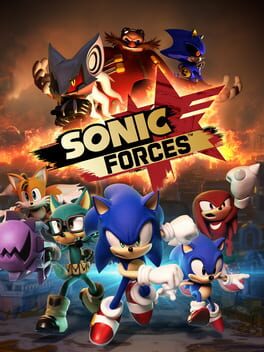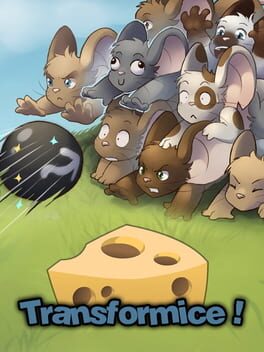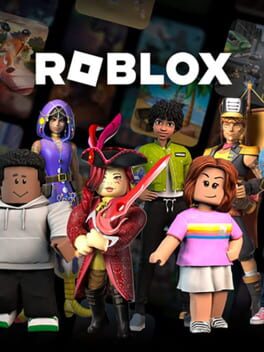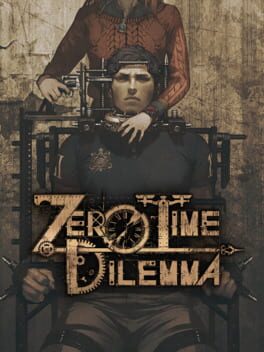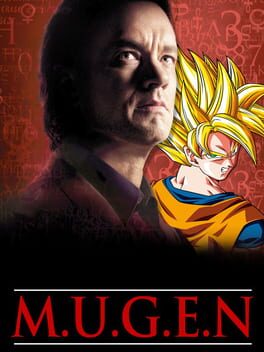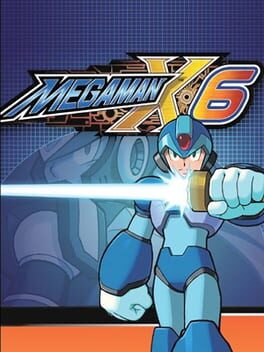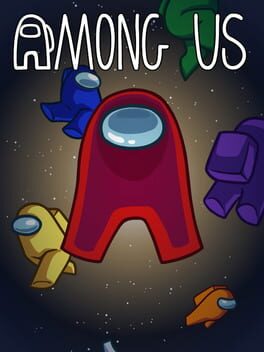MegaxReborn
30 Reviews liked by MegaxReborn
Sonic Forces
2017
Transformice
2010
Roblox
2006
Bleach: Dark Souls
2007
Sonic Forces
2017
Ok wow, I didn’t expect to warm up to Forces nearly as much as I did on this replay. I’ve had the idea of giving Forces another honest shot for quite a while. This is both because some discussion of the game I’ve seen on twitter made me start to see the game from a perspective that I previously hadn’t really considered before, and the fact that it no longer has the awkward stigma of being the “big new Sonic title” now that Frontiers is on the horizon. I had a pretty deep hatred for this game because of how it represented the current state of the franchise, where the series had a pretty grim future if this is the best that they could do with the IP. However, the time where it was the current state of the franchise appears to be well behind us. Having that grandiose viewpoint of Forces was a bit silly in retrospect, and I feel like thanks to it not having to be in the spotlight as the most recent big flagship title, it’s much easier to look at the game on its own terms. But beyond that, I mentioned a perspective that I hadn’t considered with the game before, and I’m honestly a bit embarrassed how I didn’t think of it; speedrunning.
With this playthrough I decided to take the route of attempting to speedrun the game’s levels, learn them inside and out and master them as I would any other Sonic game that I’m fond of. Taking this approach was incredibly rewarding in the case of modern Sonic and the avatar, and it helped me appreciate what makes Forces unique to the other boost games. Biggest thing that stood out to me was the way Sonic’s boost functions. It’s a far cry from any of the previous boosts mechanically with how it can influence aerial movement, whether it’s timing it just right with a jump or using the new aerial boost to fly through the sky. The latter is definitely my favorite inclusion to Sonic’s kit, it opens up options for shortcuts quite considerably, allowing for some insanely cool skips throughout levels. I wouldn’t mind seeing this form of the boost more often in games moving forward. Speedrunning levels in this game in general gives a much heavier emphasis on sequence breaking than I’ve experienced in other entries. More often than not, if there’s a scripted cinematic element to a stage, live an automated rail loop, there’s a way you can skip past it. Noticed this especially with my attempts on Metropolitan Highway, my favorite stage in the game. There’s a good amount of automated parts like the rail spirals at the beginning that you can go right past with skillful maneuvering. It’s kind of ironic how the biggest problem I had with the game mechanically was its heavy automation, while what made me love the game so much more on this playthrough was being able to blow right past it. I don’t prefer this approach to the level design of Unleashed or especially Generations, definitely not, but it was really enjoyable. This also applies to a smaller extent to the Avatar stages, with how Wispons can change the way you approach level design and your loadouts. This also made me appreciate how the Wisps are much more seamlessly integrated into gameplay than their previous appearances. Though it is slightly dampened by the Drill Wispon just being the best one for tearing through levels, but even then there’s some fun to be had by ripping stages to shreds with a Giga Drill Break ripped right out from Gurren Lagann.
The biggest problem that Forces has as a game is that it does not make for a good casual playthrough. If you’re just planning on going through the whole story and nothing more, then I can’t say that Forces will be worth your time in that regard. However, if you are willing to approach it with the philosophy I have with most Sonic games, that repeated attempts at mastery and getting faster can transform the experience of them like no other, then you might be in for a surprisingly fun experience.
Tldr: It's a perfectly fine game that's really fun to sink your teeth into, but came out at a time when it really wasn't what the series needed
Side Note: Classic Sonic is still garbage, has no place in this game and I better not see him in 3D ever again.
With this playthrough I decided to take the route of attempting to speedrun the game’s levels, learn them inside and out and master them as I would any other Sonic game that I’m fond of. Taking this approach was incredibly rewarding in the case of modern Sonic and the avatar, and it helped me appreciate what makes Forces unique to the other boost games. Biggest thing that stood out to me was the way Sonic’s boost functions. It’s a far cry from any of the previous boosts mechanically with how it can influence aerial movement, whether it’s timing it just right with a jump or using the new aerial boost to fly through the sky. The latter is definitely my favorite inclusion to Sonic’s kit, it opens up options for shortcuts quite considerably, allowing for some insanely cool skips throughout levels. I wouldn’t mind seeing this form of the boost more often in games moving forward. Speedrunning levels in this game in general gives a much heavier emphasis on sequence breaking than I’ve experienced in other entries. More often than not, if there’s a scripted cinematic element to a stage, live an automated rail loop, there’s a way you can skip past it. Noticed this especially with my attempts on Metropolitan Highway, my favorite stage in the game. There’s a good amount of automated parts like the rail spirals at the beginning that you can go right past with skillful maneuvering. It’s kind of ironic how the biggest problem I had with the game mechanically was its heavy automation, while what made me love the game so much more on this playthrough was being able to blow right past it. I don’t prefer this approach to the level design of Unleashed or especially Generations, definitely not, but it was really enjoyable. This also applies to a smaller extent to the Avatar stages, with how Wispons can change the way you approach level design and your loadouts. This also made me appreciate how the Wisps are much more seamlessly integrated into gameplay than their previous appearances. Though it is slightly dampened by the Drill Wispon just being the best one for tearing through levels, but even then there’s some fun to be had by ripping stages to shreds with a Giga Drill Break ripped right out from Gurren Lagann.
The biggest problem that Forces has as a game is that it does not make for a good casual playthrough. If you’re just planning on going through the whole story and nothing more, then I can’t say that Forces will be worth your time in that regard. However, if you are willing to approach it with the philosophy I have with most Sonic games, that repeated attempts at mastery and getting faster can transform the experience of them like no other, then you might be in for a surprisingly fun experience.
Tldr: It's a perfectly fine game that's really fun to sink your teeth into, but came out at a time when it really wasn't what the series needed
Side Note: Classic Sonic is still garbage, has no place in this game and I better not see him in 3D ever again.
Fate/Extra
2010
"There are no grades given for goals and wishes. No matter how small they may seem to others, as long as I keep moving forward they will eventually come to fruition.
As it is the desire for that wish to become reality that will keep you going until the end."
This is gonna be the single most biased review in all of history so buckle up.
Type Moon's magnum opus, the first and best game of Kazuya Niino's PSP trilogy.
I love Fate/EXTRA to death, it is the most masterfully crafted and methodically put together piece of media I've ever had the pleasure to experience.
This is the story of Hakuno Kishinami searching for themselves amidst a dire scenario where they have to face mankind at its purest state to fully understand the meaning of being human, the thing that drives us to go out there and want to make a difference, stand by our values and enjoy life even at its harshest moments.
Every foe they face carries a theme and none of them are wasted. It builds this incredibly flawless character study of humanity itself through people who embody the aspects that define us as people.
Shinji's friendship and greed, Dan's pride and code of honor, Alice's vulnerability and need for support, Gatou's religious clinging, Ronnie's downfall to the carnal desire, Julius' search for love, Rani's understanding of humanity and Rin's rebellion against stagnation (Cleverly both defining aspects of Hakuno, who they get to interact with the most), Leo's strive towards perfection and Twice's nihilistic and bitter but ultimately thoughtful view on the process of human evolution.
It wastes no beats and packs so much density in such a perfectly tied narrative.
The recontextualization of the Holy Grail War into a death game that dissects humanity is a sight to behold.
The servant trinity is an absolute highlight. Nero, Nameless and Tamamo are fantastic. They provide an amazing replay value to the game since each one has their own distinct chemistry with Hakuno and they're all so fucking cool man I love them so much.
There's an infinity of nuance and depth to explore after multiple playthroughs and way too many shower thought sessions.
Hakuno Kishinami is my favorite character of all time. Don't see that ever changing either. There's something truly special with Hakuno that gets me in a way no other character ever could and I honestly cannot point out what it is specifically. Is it their beautiful story of self recognition? Is it their awe inspiring unbreakable resolve and strive towards betterment of the body and mind? Is it their bittersweet and often times heart wrenching purity that leads them to still find a worth to this life they were given even amidst this hellish scenario? I honestly can't tell and I could waste 90% of this review just gushing about every single character defining line they hit you with like a hammer when you least expect, however I do want to keep this spoiler free so I don't want to delve into the specifics and revelations about their character. They're just the best man, I love my Hakuno Kishinami so much.
Even without spoilers I will say tho the ending is the most beautiful and heartfelt conclusion possible to this story accompanied by an ending quote that instantly became my favorite bit of writing ever.
I don't think exploring the writing any further is needed since there's just WAY too much to talk about so yeah it's the coolest fucking shit ever written. #ThankYouNiino
Outside of the writing, it's a game that aged like wine visually. The look of Niino's games are always artistically driven to the bone and EXTRA is no different. The dungeons are extremely striking and creative, Tsukihimihara is such a cool place to live in, Wada's art is awesome, the enemies look so wacky and fun...
I DON'T EVEN NEED TO SAY ANYTHING ABOUT THE OST BRUH THAT SHIT IS NUCLEAR BANGER ITS BEEN KNOWN SHINJI HOSOE TE AMO JAZZ FOR THE SOUUUULLL
The gameplay is infamously the divisive factor but I personally am a fan. I respect the hustle Niino has for never going for the traditional no matter what with the combat in his games (I will get to Black Rock Shooter's bizarre third person turn based jrpg combat) and the RPS combat has layers beyond its initial RNG factor. Boss fights in particular are immensely fun with this system, at the cost of a repetitive but decent usage against average mobs.
In summary, it's a game that drips heart through every single one of its pores, has so much to say while at the same time being so simple and sincere at its core. A masterpiece in every sense of the word. A game I will forever hold dear and cherish, truly a lifechanging experience that has been shaking up how I perceive myself and life as a whole immensely during these early stages of adulthood.
Also Hakuno is so fucking hot please have sex with me I am begging you
As it is the desire for that wish to become reality that will keep you going until the end."
This is gonna be the single most biased review in all of history so buckle up.
Type Moon's magnum opus, the first and best game of Kazuya Niino's PSP trilogy.
I love Fate/EXTRA to death, it is the most masterfully crafted and methodically put together piece of media I've ever had the pleasure to experience.
This is the story of Hakuno Kishinami searching for themselves amidst a dire scenario where they have to face mankind at its purest state to fully understand the meaning of being human, the thing that drives us to go out there and want to make a difference, stand by our values and enjoy life even at its harshest moments.
Every foe they face carries a theme and none of them are wasted. It builds this incredibly flawless character study of humanity itself through people who embody the aspects that define us as people.
Shinji's friendship and greed, Dan's pride and code of honor, Alice's vulnerability and need for support, Gatou's religious clinging, Ronnie's downfall to the carnal desire, Julius' search for love, Rani's understanding of humanity and Rin's rebellion against stagnation (Cleverly both defining aspects of Hakuno, who they get to interact with the most), Leo's strive towards perfection and Twice's nihilistic and bitter but ultimately thoughtful view on the process of human evolution.
It wastes no beats and packs so much density in such a perfectly tied narrative.
The recontextualization of the Holy Grail War into a death game that dissects humanity is a sight to behold.
The servant trinity is an absolute highlight. Nero, Nameless and Tamamo are fantastic. They provide an amazing replay value to the game since each one has their own distinct chemistry with Hakuno and they're all so fucking cool man I love them so much.
There's an infinity of nuance and depth to explore after multiple playthroughs and way too many shower thought sessions.
Hakuno Kishinami is my favorite character of all time. Don't see that ever changing either. There's something truly special with Hakuno that gets me in a way no other character ever could and I honestly cannot point out what it is specifically. Is it their beautiful story of self recognition? Is it their awe inspiring unbreakable resolve and strive towards betterment of the body and mind? Is it their bittersweet and often times heart wrenching purity that leads them to still find a worth to this life they were given even amidst this hellish scenario? I honestly can't tell and I could waste 90% of this review just gushing about every single character defining line they hit you with like a hammer when you least expect, however I do want to keep this spoiler free so I don't want to delve into the specifics and revelations about their character. They're just the best man, I love my Hakuno Kishinami so much.
Even without spoilers I will say tho the ending is the most beautiful and heartfelt conclusion possible to this story accompanied by an ending quote that instantly became my favorite bit of writing ever.
I don't think exploring the writing any further is needed since there's just WAY too much to talk about so yeah it's the coolest fucking shit ever written. #ThankYouNiino
Outside of the writing, it's a game that aged like wine visually. The look of Niino's games are always artistically driven to the bone and EXTRA is no different. The dungeons are extremely striking and creative, Tsukihimihara is such a cool place to live in, Wada's art is awesome, the enemies look so wacky and fun...
I DON'T EVEN NEED TO SAY ANYTHING ABOUT THE OST BRUH THAT SHIT IS NUCLEAR BANGER ITS BEEN KNOWN SHINJI HOSOE TE AMO JAZZ FOR THE SOUUUULLL
The gameplay is infamously the divisive factor but I personally am a fan. I respect the hustle Niino has for never going for the traditional no matter what with the combat in his games (I will get to Black Rock Shooter's bizarre third person turn based jrpg combat) and the RPS combat has layers beyond its initial RNG factor. Boss fights in particular are immensely fun with this system, at the cost of a repetitive but decent usage against average mobs.
In summary, it's a game that drips heart through every single one of its pores, has so much to say while at the same time being so simple and sincere at its core. A masterpiece in every sense of the word. A game I will forever hold dear and cherish, truly a lifechanging experience that has been shaking up how I perceive myself and life as a whole immensely during these early stages of adulthood.
Also Hakuno is so fucking hot please have sex with me I am begging you
M.U.G.E.N
1999
Chrome Dino
2014
El Chavo Kart
2014
Mega Man X6
2001
Megaman X6 is kind of an odd game and I feel like it tries to do a lot of cool things, even if not entirely successful, but my point in this review is really to illustrate why it is one of my favorite games. I've played through it a lot, often coming back for it on almost a yearly basis to give it another spin, usually playing it on "Xtreme" because I feel the extra difficulty makes the specific parts of the game I like work better than just playing it on normal.
I always viewed this game as an attempt to focus more on the exploration aspect of the franchise, and that is part of why I feel like this game has an almost "metroidvania"-like touch to it, although taking place within the basic established Megaman X structure. Every level has an alternate path to take, aside from just completing it normally, thereby making it clear that they anticipated that players would revisit levels and focus on seeking out what advantages they could. There is one deterrent in particular, but I'll get to that in a bit. The reason it reminds me of a metroidvania is moreso the parts, weapons, life upgrades and armors that you can collect and how they function in a way that enables you to access new things with the tools you have already found, whether this act of accessing is a matter of enabling it outright, or a matter of making it easier to reach. In comparison, the other Megaman X titles don't really require you to pick up anything in most cases, and can basically be beaten just going through the bosses, which is not a bad thing at all, and in some respects even commendable, but that's also why I think this game shines to me. I feel like it gives me way more reasons to use the kit I acquire, whereas in other MMX games I sometimes feel like I am just collecting things for the sake of having 100%, in this game I tend to prioritize stages to obtain specific tools I deem crucial to completing the game. I find this shift in item design is particularly apparent when looking at the first final stage of this game, Gate's Lab. The very first thing the scientist decides to bar your path with is to place a seemingly impossible to conventionally traverse spike wall in your way. And there are multiple solutions to tackling this problem, via different tools or the use of different parts, or armors. I personally really like this, because the final set of levels is also accessible extremely early in the game, thereby not requiring actually completing all the levels and leaving it to the player when they feel ready to engage, or if they are aware of certain tricks or methods to circumvent the barrier of entry.
I think the reploids/parts system helps encourage investigating every stage for tools to aid you in overcoming what the game throws at you, and this manifests especially when a certain section of a level is too tricky to get through (not to say that it isn't possible to for example pick Blaze Heatnix as your first stage). The saveable reploids in X5 seemed to me like an idea that never saw proper execution, but I think in this game they managed to make it pretty fun to try and save as many of them as you can, giving them items to reward you with. The caveat here is that they can permanently die via corruption by the nightmares, and I think this may constitute a grave offense to many. But when you just roll with it, I don't really think it's that bad. In a more arcade-like approach, this kind of thing doesn't seem like an issue, but I guess in the mindset of treating games as a one-and-done kind of activity in which 100% first time around is the expectation, it may be easy to find it annoying. In this regard, I feel like the nature of this game as a console game kind of works against what I think they were potentially aiming for, and that's a recurring problem I have with this franchise's exploration mechanics vs its identity as an action platformer. Many of the game elements seem to be laid out in a way to reward people who like to play through the game repeatedly by inviting to mix things up and try different approaches, while others lend themselves more to a progression-focused approach as is more typical with console games. Personally, I enjoy the extra stakes and have gotten pretty used to the more precariously placed reploids, although I would be lying if I didn't feel on edge when I try to save a couple of them and have ended many a run with less than 100% saved. However, none of the truly crucial reploids are usually at any risk of getting killed. A lot of them do not even have anything of value on them, but they still give the player a potential breather by granting some health and extra lives, the former of which can be particularly nice in Xtreme, as health pickups are otherwise very scarce and do not drop from random enemies. That being said, and this is the aforementioned deterrent, I actually have a bit of an issue with the extra lives, but that's mostly because of the fact that the game does not let you just exit levels anytime unless you have beaten the boss at the end of the stage. I think it would have been better to come up with an alternate method to withdraw from a level to further illustrate the more "finding tools" oriented gameplay the game seems to lend itself to, but there is the very real possibility that it was not really intended to be played like that. However, even then, Game Overs in this game are essentially meaningless, as lives are a commonplace currency and there is no real repercussion. They ultimately just get in the way of exiting levels, assuming you are stuck staring at High Max without the necessary tools to defeat him, which I would also consider a potential oversight. It feels more like a remnant of the franchise rather than something tailored to the game, but is ultimately not enough to deter me from enjoying the game.
Another noticeable evolution/offshoot of something previously found mostly in the first entry of the series, the nightmare system looks to me to be an attempt at introducing more routing variance to the game, trying to discourage players from following the most convenient route and serving as a sort of counterbalance to the player's increasing amount of power, making it a little bit trickier to route out the boss order. The first one or two levels you do will not have any nightmare effects whatsoever (it depends a bit on the sequence, and what nightmare effects you view depend on the levels you visit), therefore permitting you to get your bearings and pick up some stuff to help you weather the system kicking in. I don't really have any issues with the nightmare effects personally, and usually mostly route around the ones I struggle with based on my experiences and preferences, but I do appreciate it in terms of trying to make players alter what levels they may have picked otherwise.
If there is any main gripe I have about X6, it is probably bosses being a bit undertuned considering how strong some of the kit the players have is, with one notable exception being Infinity Mijinion, who I am particularly fond of (he has the cutest sound effects, too.) I think a lot of this is attributable to the rushed/intense development time the game had, and while it would have been nice to see how they would have balanced it given more time, gotta take what you get. There are some pretty cheesy methods and bugs you can employ to quickly delete bosses, but I think even aside from that the bosses could have been tuned up a little. The Xtreme difficulty at least mixes up the difficulty of the stages in that some of the easier stages in normal mode end up being far harder due to the increased damage taken, enemy health, placement and quantity. Having new moves for every boss in this difficulty is nice, too. I think to me, the big hurdle is in many cases the stage itself rather than the boss, and that is fine.
Story-wise, the game's unfortunate translation is in a way a charming reminder that this franchise has seemingly never been a particularly big budget endeavour as far as Capcom games go, and perhaps also kind of a blessing in that it retained the japanese voice acting over some kind of amateurish dub. There are some pretty well-known voice actors on board for X6, such as Norio Wakamoto also known from his role as Chiyo's Dad in Azumanga Daioh. In all honesty, looking at how they localized the previous two entries in the series I hardly blame them for cutting the costs and effort in this regard and do cut them some slack regarding the quality of the translation. I think it is apparent enough what the overall story is like from the cutscenes, even if there are some noticeable errors or strange miswordings that only become clearer when inspecting the japanese original text. For what it's worth, Gate as a villain is a nice departure, and I like the robots' designs having signature details like the head crystals, and I like their backstories. Alia also gets a surprising amount of characterization in her comments on the bosses you have retired, as well as featuring prominently in a bunch of cutscenes.
So, while this game is pretty flawed and a bit all over the place in terms of its balancing, I can't help but enjoy it, it really lends itself well to me as a player in particular and stands out to me from the rest of the X franchise as a result. I think the general reception this game has received from other reviewers and fans makes it pretty evident that it is far from everybody's cup of tea, but it absolutely is mine.
I always viewed this game as an attempt to focus more on the exploration aspect of the franchise, and that is part of why I feel like this game has an almost "metroidvania"-like touch to it, although taking place within the basic established Megaman X structure. Every level has an alternate path to take, aside from just completing it normally, thereby making it clear that they anticipated that players would revisit levels and focus on seeking out what advantages they could. There is one deterrent in particular, but I'll get to that in a bit. The reason it reminds me of a metroidvania is moreso the parts, weapons, life upgrades and armors that you can collect and how they function in a way that enables you to access new things with the tools you have already found, whether this act of accessing is a matter of enabling it outright, or a matter of making it easier to reach. In comparison, the other Megaman X titles don't really require you to pick up anything in most cases, and can basically be beaten just going through the bosses, which is not a bad thing at all, and in some respects even commendable, but that's also why I think this game shines to me. I feel like it gives me way more reasons to use the kit I acquire, whereas in other MMX games I sometimes feel like I am just collecting things for the sake of having 100%, in this game I tend to prioritize stages to obtain specific tools I deem crucial to completing the game. I find this shift in item design is particularly apparent when looking at the first final stage of this game, Gate's Lab. The very first thing the scientist decides to bar your path with is to place a seemingly impossible to conventionally traverse spike wall in your way. And there are multiple solutions to tackling this problem, via different tools or the use of different parts, or armors. I personally really like this, because the final set of levels is also accessible extremely early in the game, thereby not requiring actually completing all the levels and leaving it to the player when they feel ready to engage, or if they are aware of certain tricks or methods to circumvent the barrier of entry.
I think the reploids/parts system helps encourage investigating every stage for tools to aid you in overcoming what the game throws at you, and this manifests especially when a certain section of a level is too tricky to get through (not to say that it isn't possible to for example pick Blaze Heatnix as your first stage). The saveable reploids in X5 seemed to me like an idea that never saw proper execution, but I think in this game they managed to make it pretty fun to try and save as many of them as you can, giving them items to reward you with. The caveat here is that they can permanently die via corruption by the nightmares, and I think this may constitute a grave offense to many. But when you just roll with it, I don't really think it's that bad. In a more arcade-like approach, this kind of thing doesn't seem like an issue, but I guess in the mindset of treating games as a one-and-done kind of activity in which 100% first time around is the expectation, it may be easy to find it annoying. In this regard, I feel like the nature of this game as a console game kind of works against what I think they were potentially aiming for, and that's a recurring problem I have with this franchise's exploration mechanics vs its identity as an action platformer. Many of the game elements seem to be laid out in a way to reward people who like to play through the game repeatedly by inviting to mix things up and try different approaches, while others lend themselves more to a progression-focused approach as is more typical with console games. Personally, I enjoy the extra stakes and have gotten pretty used to the more precariously placed reploids, although I would be lying if I didn't feel on edge when I try to save a couple of them and have ended many a run with less than 100% saved. However, none of the truly crucial reploids are usually at any risk of getting killed. A lot of them do not even have anything of value on them, but they still give the player a potential breather by granting some health and extra lives, the former of which can be particularly nice in Xtreme, as health pickups are otherwise very scarce and do not drop from random enemies. That being said, and this is the aforementioned deterrent, I actually have a bit of an issue with the extra lives, but that's mostly because of the fact that the game does not let you just exit levels anytime unless you have beaten the boss at the end of the stage. I think it would have been better to come up with an alternate method to withdraw from a level to further illustrate the more "finding tools" oriented gameplay the game seems to lend itself to, but there is the very real possibility that it was not really intended to be played like that. However, even then, Game Overs in this game are essentially meaningless, as lives are a commonplace currency and there is no real repercussion. They ultimately just get in the way of exiting levels, assuming you are stuck staring at High Max without the necessary tools to defeat him, which I would also consider a potential oversight. It feels more like a remnant of the franchise rather than something tailored to the game, but is ultimately not enough to deter me from enjoying the game.
Another noticeable evolution/offshoot of something previously found mostly in the first entry of the series, the nightmare system looks to me to be an attempt at introducing more routing variance to the game, trying to discourage players from following the most convenient route and serving as a sort of counterbalance to the player's increasing amount of power, making it a little bit trickier to route out the boss order. The first one or two levels you do will not have any nightmare effects whatsoever (it depends a bit on the sequence, and what nightmare effects you view depend on the levels you visit), therefore permitting you to get your bearings and pick up some stuff to help you weather the system kicking in. I don't really have any issues with the nightmare effects personally, and usually mostly route around the ones I struggle with based on my experiences and preferences, but I do appreciate it in terms of trying to make players alter what levels they may have picked otherwise.
If there is any main gripe I have about X6, it is probably bosses being a bit undertuned considering how strong some of the kit the players have is, with one notable exception being Infinity Mijinion, who I am particularly fond of (he has the cutest sound effects, too.) I think a lot of this is attributable to the rushed/intense development time the game had, and while it would have been nice to see how they would have balanced it given more time, gotta take what you get. There are some pretty cheesy methods and bugs you can employ to quickly delete bosses, but I think even aside from that the bosses could have been tuned up a little. The Xtreme difficulty at least mixes up the difficulty of the stages in that some of the easier stages in normal mode end up being far harder due to the increased damage taken, enemy health, placement and quantity. Having new moves for every boss in this difficulty is nice, too. I think to me, the big hurdle is in many cases the stage itself rather than the boss, and that is fine.
Story-wise, the game's unfortunate translation is in a way a charming reminder that this franchise has seemingly never been a particularly big budget endeavour as far as Capcom games go, and perhaps also kind of a blessing in that it retained the japanese voice acting over some kind of amateurish dub. There are some pretty well-known voice actors on board for X6, such as Norio Wakamoto also known from his role as Chiyo's Dad in Azumanga Daioh. In all honesty, looking at how they localized the previous two entries in the series I hardly blame them for cutting the costs and effort in this regard and do cut them some slack regarding the quality of the translation. I think it is apparent enough what the overall story is like from the cutscenes, even if there are some noticeable errors or strange miswordings that only become clearer when inspecting the japanese original text. For what it's worth, Gate as a villain is a nice departure, and I like the robots' designs having signature details like the head crystals, and I like their backstories. Alia also gets a surprising amount of characterization in her comments on the bosses you have retired, as well as featuring prominently in a bunch of cutscenes.
So, while this game is pretty flawed and a bit all over the place in terms of its balancing, I can't help but enjoy it, it really lends itself well to me as a player in particular and stands out to me from the rest of the X franchise as a result. I think the general reception this game has received from other reviewers and fans makes it pretty evident that it is far from everybody's cup of tea, but it absolutely is mine.
Among Us
2018
Among Us
2018
Among Us is divided into 2 phases: the meeting phase (debating who to vote out) and the roaming phase (doing tasks/killing). Because of this differentiation, the roaming phase does not interfere with aspects of the meeting phase (e.g. conversations). This leads to conversations in the form of debates instead of split-second decisions. In that respect Among Us is closer to the original games in the genre like Mafia and Werewolves. Outside of meetings, conversations are not permitted, which shifts the focus to stealth and intel gathering.
Among Us doesn’t rely on a single intricate mechanic to create depth. It instead uses combinations of game elements to introduce variety. Notably, the meta and psychological aspects enrich the strategic complexity despite the underlying mechanics being simple.
Let us consider the core element of the roaming phase: routing. During this phase, the main focus is deciding where to go. If there were no impostors in the game, this would be a simple task of pathing to finish the current tasks as quickly as possible. The presence of an impostor adds an extra layer of complexity: crewmates need to also gather intel regarding where other players are located. In the first round of the game most of the decisions are based on meta-knowledge about other players: individual strategies for intel gathering, tasks players tend to go for, solitary vs group players, how they tend to play as a Crewmate/Impostor, etc. Another option is to take a risk to clear a player by sticking with them (i.e. using yourself as bait). This is a double-edged sword, however, as the Impostor can choose not to go for an easy kill, gaining the trust of the Crewmate testing him (a.k.a. “marinating”). Such risks play a central role in the game. For instance, players that have vital information would avoid dying at any cost so that they can bring it to the meetings. On the other hand, a Crewmate may also want to die:
- sticking to someone that they suspect is an Impostor to tie their hands even by risking their own life.
- to use the noclip and faster speed of being a ghost to finish their tasks faster
- to clear any suspicion over themselves (so the other Crewmates don’t mistakenly think that they’re an Impostor).
Later on, with information from meetings on who is likely to be an Impostor or a Crewmate, more elaborate routes can be devised. Players can also use meetings to gather information about other players’ tasks in order to predict their routes next round.
The emphasis in meeting phases is on deductive and conversational aspects of the game. The information we get in the roaming phase alone is usually not good enough to paint a picture of how the whole round played out. Thus we need to make assumptions based on some kind of deduction. On top of that, the meetings give us information from other parties in the game, letting us make even more accurate deductions to find the Impostors. With good game knowledge enough crewmates by sharing all information, the impostors would be found. (Except in some weird cases where everyone was just speedrunning their tasks, and not getting any information at all). However, it would be foolish for the impostors to let the crewmates do as they please, and this is where the conversational aspect of the game comes into play. In the scenario that the kills haven't been clean in the game (this means the blame for the kill can't be pinpointed to a single or a small group of people), the impostors won't have any benefit of letting the conversation go on untouched. The most direct way to disrupt the meeting conversation is through lies. With a lie, the information deduction alone would not be able to get to a correct answer, though this depends on the type of the lie. A stronger, more direct lie could change the narrative in a predictable way. It can be used to frame or clear someone. Yet such lies would be easy to trace to the liar. They can be more easily found by conflict with other known information, and thus could backfire. It requires a lot of information from the liar, to be able to pull off such a lie. Also, they have to seem trustworthy since they usually won't get backing for that false information (outside of their impostor partner). More importantly, such lies could be found out in later rounds of the game. While it could pay off this round it could cost the impostors the game in the end. More common and useful lies would be a small change of information somewhere deeper in the deduction. (Further away from clearing or pinning someone as an impostor and more about basic information). The benefit of that lie is that it is hard to trace to the liar, but at the same time, the effect is not as clear. However this could again be used - while it wouldn't frame someone for a kill or clear someone, it is effective in wasting time. It is also a safe lie since it might be considered an error rather than a lie as well. Honourable mention to lying by omission. Depending on the context it could be either of 2 types of lies above, and it could even be safer in most scenarios.
Something even more common than lying is conversation control. There is a time limit on each meeting, and players have one button per game they could use for meetings. Note that some meetings can't be extended by those buttons, as the impostors could win if there is a wrong decision in those meetings. Because of that, it is important to be efficient with information. Getting all information out of all players, and sharing deductions from everyone is easier said than done in that short amount of time. This is why the flow of the conversation is important - and also this is where the impostor has an advantage. The impostors know how their own kill happened (and potentially even the kill of their partner) so they know which information is vital. Thus if they control the flow of the conversation they can waste a lot of time on useless information and deductions out of players. This could be used in combination with a lie and to reinforce the lie, by not letting conflicting information in the conversation. Of course, all of this has its own risk, as being wasteful of conversation time is suspicious. An important thing to be noted is that the impostors' lies and disturbance of conversation have an important side effect. It isn't just the impostors that have to deal with scrutinizing their information and deductions, all information would be scrutinized no matter if it is true or false. This is also dependent on the player itself, other ingame information, as well as psychology and meta. Because of this, the players should also worry about their trustworthiness and not just figuring out the killer. You might have everything figured out, but if you can't say it in the short amount of time and convince others, you can't do anything. Even worse someone might undermine your trustworthiness and bring you down - you have to both be good at deduction and conversations to win. One anomaly from this is that there are actually now reasons for crewmates to lie. Saving time, being trustworthy and even catching lies from another player. This does have an innate risk, but it would be often a better choice than telling the truth.
An important element to the deduction is the intel gathering itself. It was mentioned early, but there is an additional aspect to the intel gathering - attention. There is a lot of information that a single player can gather in a single round, but remembering it all isn't an easy thing to do. If there are more alive players, or if the round itself is long, holding old information becomes trouble. While often this information is discarded, if there have been and early kill, without such information it would be untraceable. The intel generally consists of where we saw each player, where they were headed and what tasks they were doing. The hard part here is that you need to remember all this information relevant to the time. Memorizing this information is relevant to some major event, or just a rough estimate of the time is hard enough on its own. Yet, the player might even opt-in counting seconds to give them more precise information in time. Not only that, but it gives information about kill cooldowns, sabotage timings, precise way to estimate if anyone is faking tasks or not. Also, it could give them information about all the possible positions a player could have reached from a last seen position. This could be vital information in determining who are the plausible killers for some kill. Less decisive, but also important but more difficult, it could also be used to catch a lie. This is done by simulating the path given by some player and comparing how well it fits with the information given by other players. Needless to say, doing deductions, counting precisely, keeping information, and making decisions for the route the player would take all at the same is an extremely difficult task. This is most likely impossible to perfect, so there is always going to be a human error of some kind. Related to this, the tasks themselves, while easy to complete and master, could affect the attention of the player. This could lead to some error either in time management or in the information they are trying to keep in their mind. On a side note, tasks also play into the information gathering aspect of the game. They obscure parts of the screen, leading to less information for a player. Also, they might only see a small feature of a player, and not be able to determine who that player is.
I would like to mention a few elements important to impostors in the roaming phase, on top of the things that have been discussed so far. Impostors have much more freedom in their routing. They still have to follow some rules so that they are not caught faking tasks, or having suspicious routes. But even those rules can be bent because of the lack of perfect information in the game. It still carries some risk, but it is unlikely for them to be caught for that. In turn, they can route solely on gathering intel and unique to impostors - setting up kills and denying information. Impostors have the advantage of bigger vision range - allowing them to gain information, without others gaining information about them back. Sabotages also are a great way of denying information. Lights deny information around the players and are also a good way to set up a kill. Communication is a way to deny long-range information. While not a great way to set up a kill (it is more situational) it is a better sabotage to call in-between kills to screw with information. Vent usages could screw up the timing of some people and the impostor could get a clear for the kill.
What should also be mentioned about the game is that despite its high skill ceiling, it is an easy game to get into. The game involves a lot of risks (which introduces luck) and it also involves expectations of players to play in a certain way. Because of that, the inexperience of newer players leads to smaller expectations on them, which in turn gives them more leeway. They are more likely to be overlooked as impostors, which is a bonus both as impostors and crewmates. Even when people get a better understanding of the newer players, they would still be given more leeway on certain actions as a crewmate. This allows more intricate routes as impostors and makes them more trustworthy, which gives them more of a fight chance.
The meta aspect is one of the important things of the game, as everything ties to it. This is also why the game works much better in a group of the same people rather than random groups. Understanding how other people play and act, and also how other people perceive you, is an essential tool you can use in the game. A unique effect of this is that a lot of your actions are going to have consequences even outside of the game that you are currently in. Thus you need to accommodate your crewmate playstyle to fit your impostor playstyle. Doing the opposite is harder, as the better player you are the more other people demand of your playstyle with a crewmate. Also, you can also set up strategies in several rounds, building trust for specific situations, to use it as an impostor in another round to win. You can't keep using that same strategy constantly, which is why you have to keep planting new seeds and adapting your strategy - you reap what you sow.
The game is not without issues. While all the things discussed so far exist, their relevance depends on the used ruleset. The bright side is that the game opt-in for a lot of options to let the people change the settings. Yet even with those settings, the game is still heavily crewmate sided, especially as players improve. The default settings are even more cremate sided, but that is expected in a game with a lower skill level, where impostors would have more of a chance. As players improve, options become more and more restrictive, and eventually, even house rules have to be introduced against some "cheese" strats that can be used to make the game fair. The maps are also a good example of this, at a high enough level all maps but one are unbalanced.
Sked is heavily shifted in crewmates favour. This is due to the lacklustre vents and the 8-like layout of the map, making it hard to find bodies and deny information. Mira is shifted on the other side. It's all interconnected vents, combined with the decontamination area and the weak information tools for the crewmates lead to this shift.
Polus is the most balanced map of the current 3. Its layout allows for a lot of complexity and room for impostors to play out, while also giving the crewmate strong information tools like vitals, admin and cameras. The only downside for that map is the lack of an equivalent of the oxygen sabotage (it isn't there for lore reasons), which doesn't give impostors a good tool for dealing with groups.
In conclusion, despite its simplistic look, the interaction of the mechanics of Among Us leads to deep gameplay. The game shines in its conversation aspect and has attention intensive tasks (not the ingame tasks) to do outside of the meetings. All those things are combined with an intricate metagame.
Among Us doesn’t rely on a single intricate mechanic to create depth. It instead uses combinations of game elements to introduce variety. Notably, the meta and psychological aspects enrich the strategic complexity despite the underlying mechanics being simple.
Let us consider the core element of the roaming phase: routing. During this phase, the main focus is deciding where to go. If there were no impostors in the game, this would be a simple task of pathing to finish the current tasks as quickly as possible. The presence of an impostor adds an extra layer of complexity: crewmates need to also gather intel regarding where other players are located. In the first round of the game most of the decisions are based on meta-knowledge about other players: individual strategies for intel gathering, tasks players tend to go for, solitary vs group players, how they tend to play as a Crewmate/Impostor, etc. Another option is to take a risk to clear a player by sticking with them (i.e. using yourself as bait). This is a double-edged sword, however, as the Impostor can choose not to go for an easy kill, gaining the trust of the Crewmate testing him (a.k.a. “marinating”). Such risks play a central role in the game. For instance, players that have vital information would avoid dying at any cost so that they can bring it to the meetings. On the other hand, a Crewmate may also want to die:
- sticking to someone that they suspect is an Impostor to tie their hands even by risking their own life.
- to use the noclip and faster speed of being a ghost to finish their tasks faster
- to clear any suspicion over themselves (so the other Crewmates don’t mistakenly think that they’re an Impostor).
Later on, with information from meetings on who is likely to be an Impostor or a Crewmate, more elaborate routes can be devised. Players can also use meetings to gather information about other players’ tasks in order to predict their routes next round.
The emphasis in meeting phases is on deductive and conversational aspects of the game. The information we get in the roaming phase alone is usually not good enough to paint a picture of how the whole round played out. Thus we need to make assumptions based on some kind of deduction. On top of that, the meetings give us information from other parties in the game, letting us make even more accurate deductions to find the Impostors. With good game knowledge enough crewmates by sharing all information, the impostors would be found. (Except in some weird cases where everyone was just speedrunning their tasks, and not getting any information at all). However, it would be foolish for the impostors to let the crewmates do as they please, and this is where the conversational aspect of the game comes into play. In the scenario that the kills haven't been clean in the game (this means the blame for the kill can't be pinpointed to a single or a small group of people), the impostors won't have any benefit of letting the conversation go on untouched. The most direct way to disrupt the meeting conversation is through lies. With a lie, the information deduction alone would not be able to get to a correct answer, though this depends on the type of the lie. A stronger, more direct lie could change the narrative in a predictable way. It can be used to frame or clear someone. Yet such lies would be easy to trace to the liar. They can be more easily found by conflict with other known information, and thus could backfire. It requires a lot of information from the liar, to be able to pull off such a lie. Also, they have to seem trustworthy since they usually won't get backing for that false information (outside of their impostor partner). More importantly, such lies could be found out in later rounds of the game. While it could pay off this round it could cost the impostors the game in the end. More common and useful lies would be a small change of information somewhere deeper in the deduction. (Further away from clearing or pinning someone as an impostor and more about basic information). The benefit of that lie is that it is hard to trace to the liar, but at the same time, the effect is not as clear. However this could again be used - while it wouldn't frame someone for a kill or clear someone, it is effective in wasting time. It is also a safe lie since it might be considered an error rather than a lie as well. Honourable mention to lying by omission. Depending on the context it could be either of 2 types of lies above, and it could even be safer in most scenarios.
Something even more common than lying is conversation control. There is a time limit on each meeting, and players have one button per game they could use for meetings. Note that some meetings can't be extended by those buttons, as the impostors could win if there is a wrong decision in those meetings. Because of that, it is important to be efficient with information. Getting all information out of all players, and sharing deductions from everyone is easier said than done in that short amount of time. This is why the flow of the conversation is important - and also this is where the impostor has an advantage. The impostors know how their own kill happened (and potentially even the kill of their partner) so they know which information is vital. Thus if they control the flow of the conversation they can waste a lot of time on useless information and deductions out of players. This could be used in combination with a lie and to reinforce the lie, by not letting conflicting information in the conversation. Of course, all of this has its own risk, as being wasteful of conversation time is suspicious. An important thing to be noted is that the impostors' lies and disturbance of conversation have an important side effect. It isn't just the impostors that have to deal with scrutinizing their information and deductions, all information would be scrutinized no matter if it is true or false. This is also dependent on the player itself, other ingame information, as well as psychology and meta. Because of this, the players should also worry about their trustworthiness and not just figuring out the killer. You might have everything figured out, but if you can't say it in the short amount of time and convince others, you can't do anything. Even worse someone might undermine your trustworthiness and bring you down - you have to both be good at deduction and conversations to win. One anomaly from this is that there are actually now reasons for crewmates to lie. Saving time, being trustworthy and even catching lies from another player. This does have an innate risk, but it would be often a better choice than telling the truth.
An important element to the deduction is the intel gathering itself. It was mentioned early, but there is an additional aspect to the intel gathering - attention. There is a lot of information that a single player can gather in a single round, but remembering it all isn't an easy thing to do. If there are more alive players, or if the round itself is long, holding old information becomes trouble. While often this information is discarded, if there have been and early kill, without such information it would be untraceable. The intel generally consists of where we saw each player, where they were headed and what tasks they were doing. The hard part here is that you need to remember all this information relevant to the time. Memorizing this information is relevant to some major event, or just a rough estimate of the time is hard enough on its own. Yet, the player might even opt-in counting seconds to give them more precise information in time. Not only that, but it gives information about kill cooldowns, sabotage timings, precise way to estimate if anyone is faking tasks or not. Also, it could give them information about all the possible positions a player could have reached from a last seen position. This could be vital information in determining who are the plausible killers for some kill. Less decisive, but also important but more difficult, it could also be used to catch a lie. This is done by simulating the path given by some player and comparing how well it fits with the information given by other players. Needless to say, doing deductions, counting precisely, keeping information, and making decisions for the route the player would take all at the same is an extremely difficult task. This is most likely impossible to perfect, so there is always going to be a human error of some kind. Related to this, the tasks themselves, while easy to complete and master, could affect the attention of the player. This could lead to some error either in time management or in the information they are trying to keep in their mind. On a side note, tasks also play into the information gathering aspect of the game. They obscure parts of the screen, leading to less information for a player. Also, they might only see a small feature of a player, and not be able to determine who that player is.
I would like to mention a few elements important to impostors in the roaming phase, on top of the things that have been discussed so far. Impostors have much more freedom in their routing. They still have to follow some rules so that they are not caught faking tasks, or having suspicious routes. But even those rules can be bent because of the lack of perfect information in the game. It still carries some risk, but it is unlikely for them to be caught for that. In turn, they can route solely on gathering intel and unique to impostors - setting up kills and denying information. Impostors have the advantage of bigger vision range - allowing them to gain information, without others gaining information about them back. Sabotages also are a great way of denying information. Lights deny information around the players and are also a good way to set up a kill. Communication is a way to deny long-range information. While not a great way to set up a kill (it is more situational) it is a better sabotage to call in-between kills to screw with information. Vent usages could screw up the timing of some people and the impostor could get a clear for the kill.
What should also be mentioned about the game is that despite its high skill ceiling, it is an easy game to get into. The game involves a lot of risks (which introduces luck) and it also involves expectations of players to play in a certain way. Because of that, the inexperience of newer players leads to smaller expectations on them, which in turn gives them more leeway. They are more likely to be overlooked as impostors, which is a bonus both as impostors and crewmates. Even when people get a better understanding of the newer players, they would still be given more leeway on certain actions as a crewmate. This allows more intricate routes as impostors and makes them more trustworthy, which gives them more of a fight chance.
The meta aspect is one of the important things of the game, as everything ties to it. This is also why the game works much better in a group of the same people rather than random groups. Understanding how other people play and act, and also how other people perceive you, is an essential tool you can use in the game. A unique effect of this is that a lot of your actions are going to have consequences even outside of the game that you are currently in. Thus you need to accommodate your crewmate playstyle to fit your impostor playstyle. Doing the opposite is harder, as the better player you are the more other people demand of your playstyle with a crewmate. Also, you can also set up strategies in several rounds, building trust for specific situations, to use it as an impostor in another round to win. You can't keep using that same strategy constantly, which is why you have to keep planting new seeds and adapting your strategy - you reap what you sow.
The game is not without issues. While all the things discussed so far exist, their relevance depends on the used ruleset. The bright side is that the game opt-in for a lot of options to let the people change the settings. Yet even with those settings, the game is still heavily crewmate sided, especially as players improve. The default settings are even more cremate sided, but that is expected in a game with a lower skill level, where impostors would have more of a chance. As players improve, options become more and more restrictive, and eventually, even house rules have to be introduced against some "cheese" strats that can be used to make the game fair. The maps are also a good example of this, at a high enough level all maps but one are unbalanced.
Sked is heavily shifted in crewmates favour. This is due to the lacklustre vents and the 8-like layout of the map, making it hard to find bodies and deny information. Mira is shifted on the other side. It's all interconnected vents, combined with the decontamination area and the weak information tools for the crewmates lead to this shift.
Polus is the most balanced map of the current 3. Its layout allows for a lot of complexity and room for impostors to play out, while also giving the crewmate strong information tools like vitals, admin and cameras. The only downside for that map is the lack of an equivalent of the oxygen sabotage (it isn't there for lore reasons), which doesn't give impostors a good tool for dealing with groups.
In conclusion, despite its simplistic look, the interaction of the mechanics of Among Us leads to deep gameplay. The game shines in its conversation aspect and has attention intensive tasks (not the ingame tasks) to do outside of the meetings. All those things are combined with an intricate metagame.
